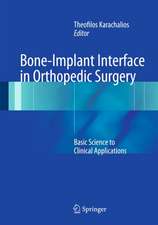A Systems Biology Approach to Study Metabolic Syndrome
Editat de Matej Orešič, Antonio Vidal-Puigen Limba Engleză Hardback – 6 oct 2013
The clearly written chapters by leading experts in the field provides detailed descriptions crucial for the unique position of this book and its focus on the application of systems biology to tackle specific pathophysiologically relevant aspects of MetS and provides a valuable practical guide to this research community.
| Toate formatele și edițiile | Preț | Express |
|---|---|---|
| Paperback (1) | 1100.30 lei 6-8 săpt. | |
| Springer International Publishing – 22 aug 2016 | 1100.30 lei 6-8 săpt. | |
| Hardback (1) | 1114.19 lei 6-8 săpt. | |
| Springer International Publishing – 6 oct 2013 | 1114.19 lei 6-8 săpt. |
Preț: 1114.19 lei
Preț vechi: 1172.83 lei
-5% Nou
Puncte Express: 1671
Preț estimativ în valută:
213.27€ • 231.73$ • 179.26£
213.27€ • 231.73$ • 179.26£
Carte tipărită la comandă
Livrare economică 21 aprilie-05 mai
Preluare comenzi: 021 569.72.76
Specificații
ISBN-13: 9783319010076
ISBN-10: 3319010077
Pagini: 350
Ilustrații: XIX, 384 p. 47 illus., 23 illus. in color.
Dimensiuni: 155 x 235 x 27 mm
Greutate: 0.91 kg
Ediția:2014
Editura: Springer International Publishing
Colecția Springer
Locul publicării:Cham, Switzerland
ISBN-10: 3319010077
Pagini: 350
Ilustrații: XIX, 384 p. 47 illus., 23 illus. in color.
Dimensiuni: 155 x 235 x 27 mm
Greutate: 0.91 kg
Ediția:2014
Editura: Springer International Publishing
Colecția Springer
Locul publicării:Cham, Switzerland
Public țintă
ResearchCuprins
The metabolic syndrome and its complex pathophysiology.-
Systems biology in human health and disease.-
The liver in metabolic syndrome.-
Role of adipose tissue in the pathogenesis and treatment of metabolic syndrome.-
The beta cell in metabolic syndrome.-
The skeletal muscle in metabolic syndrome.-
The central nervous system in metabolic syndrome.-
Lipid metabolism in metabolic syndrome.-
Gut microbiota in metabolic syndrome.-
Proteomics in the systems-level study of the metabolic syndrome.-
Metabolomics in the systems-level study of the metabolic syndrome.- Fluxomics.-
In vitro colon model to study metabolic syndrome.-
Genome-scale modeling of tissue and cancer metabolism.-
Modeling of lipid membranes and lipoproteins.-
Computational statistics approaches to study metabolic syndrome.-
Towards modeling of metabolic syndrome: Tissue crosstalk in lipid spillover.
Systems biology in human health and disease.-
The liver in metabolic syndrome.-
Role of adipose tissue in the pathogenesis and treatment of metabolic syndrome.-
The beta cell in metabolic syndrome.-
The skeletal muscle in metabolic syndrome.-
The central nervous system in metabolic syndrome.-
Lipid metabolism in metabolic syndrome.-
Gut microbiota in metabolic syndrome.-
Proteomics in the systems-level study of the metabolic syndrome.-
Metabolomics in the systems-level study of the metabolic syndrome.- Fluxomics.-
In vitro colon model to study metabolic syndrome.-
Genome-scale modeling of tissue and cancer metabolism.-
Modeling of lipid membranes and lipoproteins.-
Computational statistics approaches to study metabolic syndrome.-
Towards modeling of metabolic syndrome: Tissue crosstalk in lipid spillover.
Textul de pe ultima copertă
The aim of this book is to provide the target audience, specifically students of Medicine, Biology, Systems Biology and Bioinformatics, as well as experienced researchers in research fields relevant to metabolic syndrome (MetS) with an overview of the challenges and opportunities in systems biology and how it can be used to tackle MetS. In particular, the aims are: (1) to provide an introduction to the key biological processes involved in the pathophysiology of MetS; (2) through the use of specific examples, provide an introduction to the latest technologies that use a systems biology approach to study MetS; and (3) to give an overview of the mathematical modeling approaches for studying MetS.
The clearly written chapters by leading experts in the field provide detailed descriptions crucial for the unique position of this book and its focus on the application of systems biology to tackle specific pathophysiologically relevant aspects of MetS and provide a valuable practical guide to this research community.
The clearly written chapters by leading experts in the field provide detailed descriptions crucial for the unique position of this book and its focus on the application of systems biology to tackle specific pathophysiologically relevant aspects of MetS and provide a valuable practical guide to this research community.
Caracteristici
A comprehensive account of using Systems Biology to study Metabolic Syndrome (MetS)
The applications of selected technologies and models to tackle specific pathophysiologically relevant aspects of metabolic syndrome
An introduction to key biological processes involved in the pathophysiology of MetS
Includes supplementary material: sn.pub/extras
The applications of selected technologies and models to tackle specific pathophysiologically relevant aspects of metabolic syndrome
An introduction to key biological processes involved in the pathophysiology of MetS
Includes supplementary material: sn.pub/extras
















